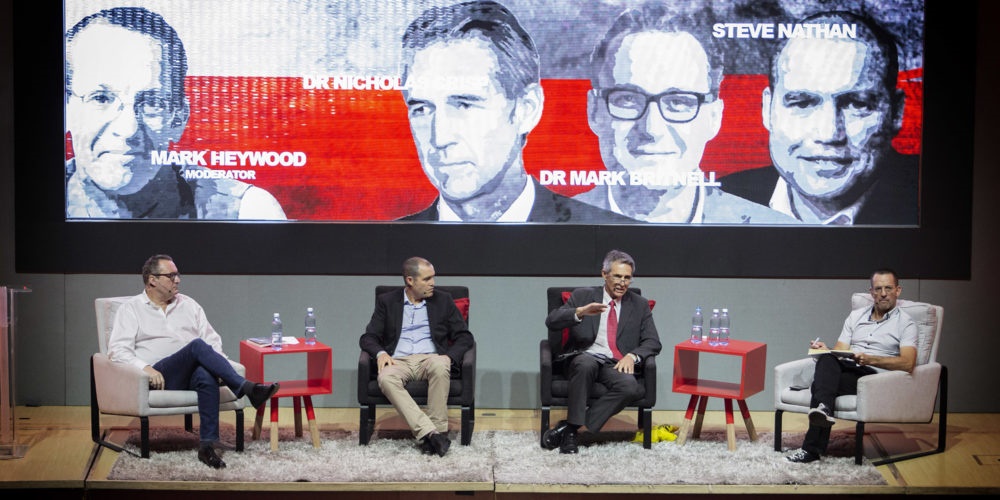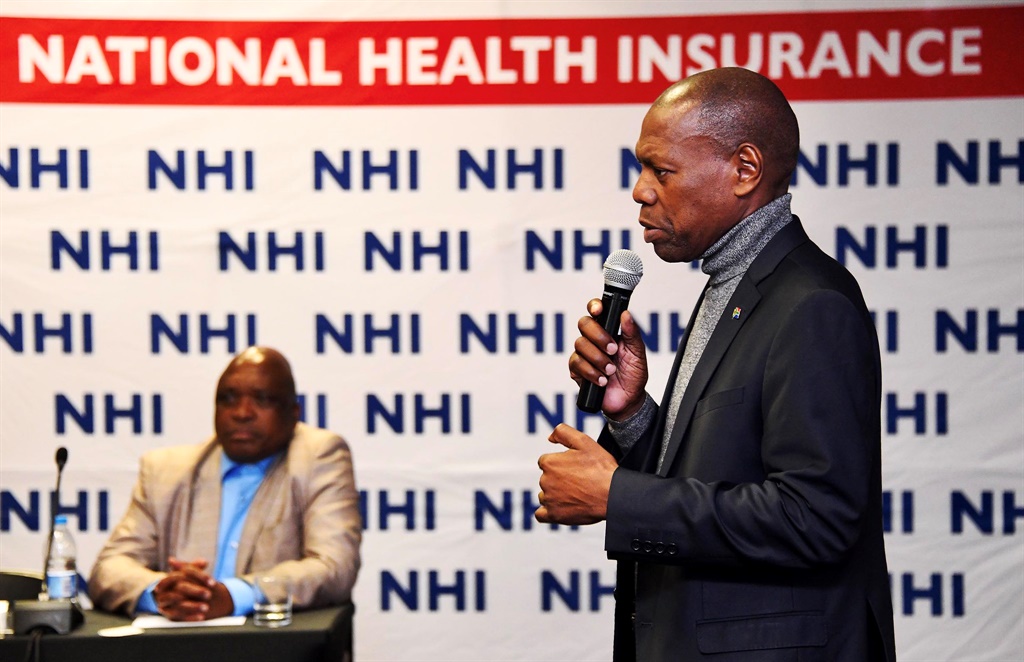One word: Mistrust.
That is what a panel discussion on South Africa’s proposed National Health Insurance (NHI) system during The Gathering 2020 zoomed in on and so captured a fundamental crack in South Africa’s engagement and discourse on NHI and the NHI Bill.
Daily Maverick hosted The Gathering 2020 Friday in Cape Town.
When MPs crisscrossed the country from November last year to February this year to get public input on the NHI Bill, the public hearings often turned into battlegrounds where people were pitted against each other based on political affiliations, race, class and a heavy dose of mistrust.
It is this mistrust that human rights activist and panel facilitator Mark Heywood succinctly captured as he steered a panel discussion on NHI – albeit a panel of three white men from a certain class – introduced as important stakeholders to the NHI debate – investors, health system experts and of course government.
The most important stakeholder to this panel discussion, however, was sorely missed – the public represented by an ordinary public health care user.
Still, the input from panel members was sobering and insightful. Among the panellists were Dr Nicholas Crisp, the man at the head of South Africa’s NHI Office, Dr Mark Britnell, senior partner for healthcare, government & infrastructure at KPMG International and Steven Nathan, former managing director of Deutsche Bank.
A deeply divisive issue
It was when Heywood asked the panellists “how do we turn the NHI as a deeply divisive issue into one holding up a common purpose” that the issue of mistrust got fleshed out properly. This is an important question, especially given public mistrust that government can deliver on NHI without turning it into another looting frenzy like South Africans have come to know through state-owned enterprises like Eskom.
Britnell reminded the audience that universal health care, “when delivered properly, is good for society, good for a nation, good for an economy and most of all good for patients”. But, said Britnell, “the problem is that when people take dogmatic and premature positions on NHI, you are in danger of throwing out the baby with the universal healthcare bathwater”.
Heywood agreed that people have often taken dogmatic and premature positions but some often for good reason based on distrust and scepticism especially around the money issues underpinning NHI and the governments “record of failure” in delivering services.
Nathan, in turn, said many South Africans are feeling “overtaxed and overburdened and the issue is one of trust and one of delivery”.
“In an ideal world we want universal healthcare but what is the cost and what is the benefit?” According to him investors and most South Africans are concerned about the government’s ability to deliver services at a level and efficiency close to that of the private sector.
“The track record that government has is incredibly poor. Government departments’ ability to deliver is very poor. So, it’s trust. It comes down to how can the government demonstrate to us that it has the capacity and the ability to add value to the system.”
On pragmatism and ideology
South Africa spends about 8.4% of its GDP on health, but, says Heywood, have very little in results to show for it – something he attributes to massive wastage in the public sector. Britnell reminded the audience there are countries like Thailand and Indonesia that are spending much less on their healthcare and yet they have a system that is still performing better than South Africa. “So, you can get a high value system which is universal, fair and of decent quality for less.” Britnell fingered South Africa’s ‘leaky’ procurement system where between 20 and 30% of the country’s supply chain “is not actually adding any value whatsoever”.
He urged that South Africa should fix the leaks in the supply chain in the public sector and put pragmatism above ideology. “The issue is that people take premature political positions, and never let them lay, so if politicians are trying to manage a party more than their country, you will reap what you sow.”
Heywood then raised the question many asked during the public hearings and written submissions on the NHI Bill – should we then not fix the leaks – fix the system before we start fumbling with an NHI Fund? “Are we going about it the right way?”
Not either or
For Crisp it is not a question of either or. “You have to do them both at the same time and get all the resources starting to align during the planning period.”
“So,” Crisp said, “you can’t address either the public or private sector – or either the money or the system – it all has to be done at the same time. It is the sequencing of how those things happen, that matters.”
He did, however, agree the public health sector needs fixing. “As taxpayers do not want to pay more money, it will have to be done through efficiencies. The problem in the public sector is that in the provincial administrations we are spending 75% to 78% of our entire health budget on personnel, on cost of employment. That means we’ve crowded out the ability to buy medicines and devices,” he said.
So, for Crisp the question is - are we using the resources and staff we have available correctly, are we deploying them to the right place, are we upskilling them appropriately?
He referred to the NHI Bill and said the Bill sets 2026 as the time by which we need to have “our ducks in a row” to be able to purchase from a central purchaser.
“Before that can happen we need the IT-systems in place, the systems need to talk to each other. The Bill says the fund will purchase directly from the hospitals - can you imagine in South Africa today how much work has to be done before we have our cost centers realigned in the government hospitals, our clinics aligned, train managers, and have delegated authorities because of the way our Public Finance Management Act works? It’s a huge amount of work, So, it’s not either or.”
A good thing?
He also responded to criticism that there is not enough detail in the NHI Bill. “But we don’t write our laws like that. We write the framework in the law and it’s called an enabling act, and then try and set goals and structure within the enabling act.
So, in the Bill there’s a suggestion of a number of phases that will take place, and there are time frames for those phases that goes for more than ten years and getting there is building blocks.”
“But,” said Heywood, “a lot of it keeps coming back to fear, trust, uncertainty”. He asked the panel how the NHI can be turned around from a “divisive issue”. Crisp conceded that trust is an issue. “It has been an issue for a long time and we as citizens have a right to distrust our government,” he said.
But, he argued, mistrust may just be a good thing. “We know there’s distrust. And in light of the Zondo Commission I think right now is the best time to start the NHI. We are more vigilant than we’ve ever been as civil society about corruption. Now is a good time to build institutions.”
Britnell in turn reminded the audience that South Africa’s situation is not unique. “I’ve worked in a lot of countries where corruption and distrust were rampant - like in South America and what they’ve done to demonstrate they want a professional universal health care service. They moved management and administration of the service to a third party. I’m not suggesting it happens here, but what you think you’re facing and think is unique, is not. There are solutions that can take trust head-on and find different ways of finding accountability through actually having professional organisations to help you manage the fund. I’m just saying that where trust is broken sometimes there usually is a solution.”
Some of the key issues of concern raised about the NHI Bill is the extensive powers given to the Minister of Health, the centralizing of authority in the National Department of Health, the complex management and procurement arrangements, and a lack of civil society representation and transparency in and of NHI structures.
Now that public input on the Bill is being evaluated in Parliament, the trust test may just depend on how seriously these concerns are taken – and to what extent government will heed recommendations that will call on it to put pragmatism and common sense above ideology.
*This article was produced by Spotlight – health journalism in the public interest




 Publications
Publications
 Partners
Partners











